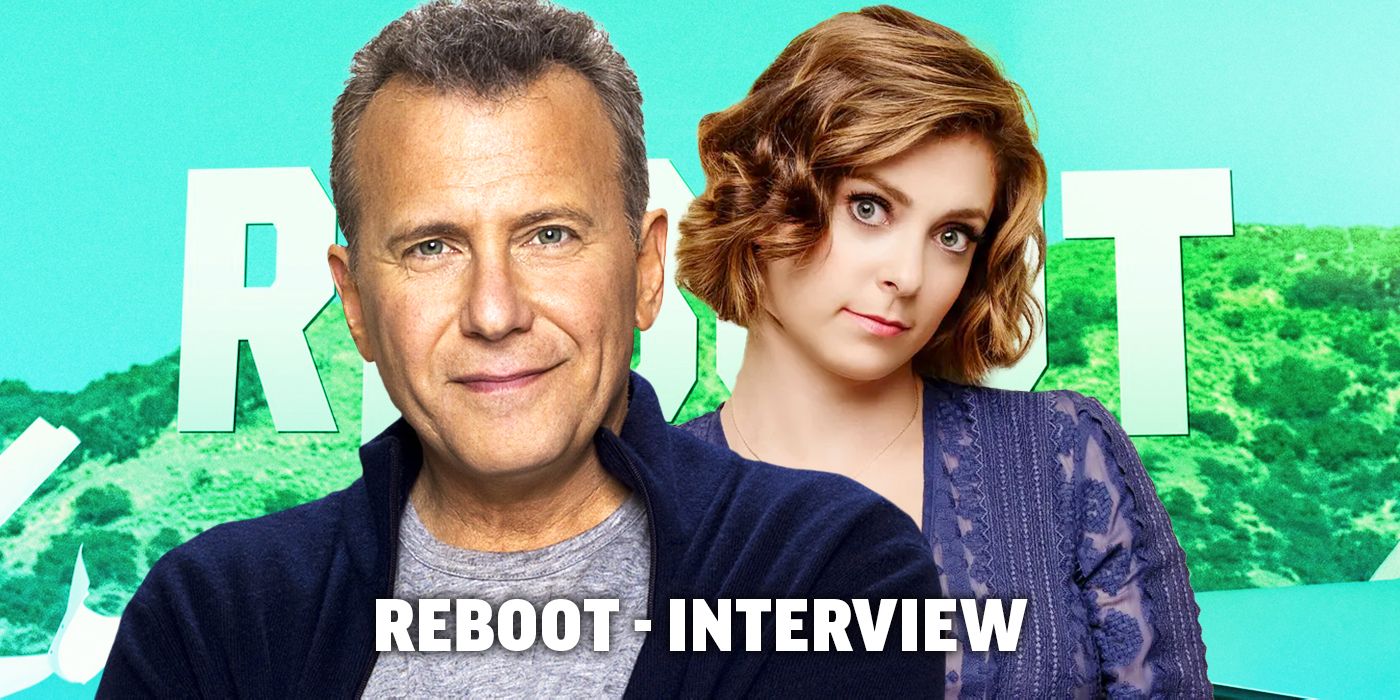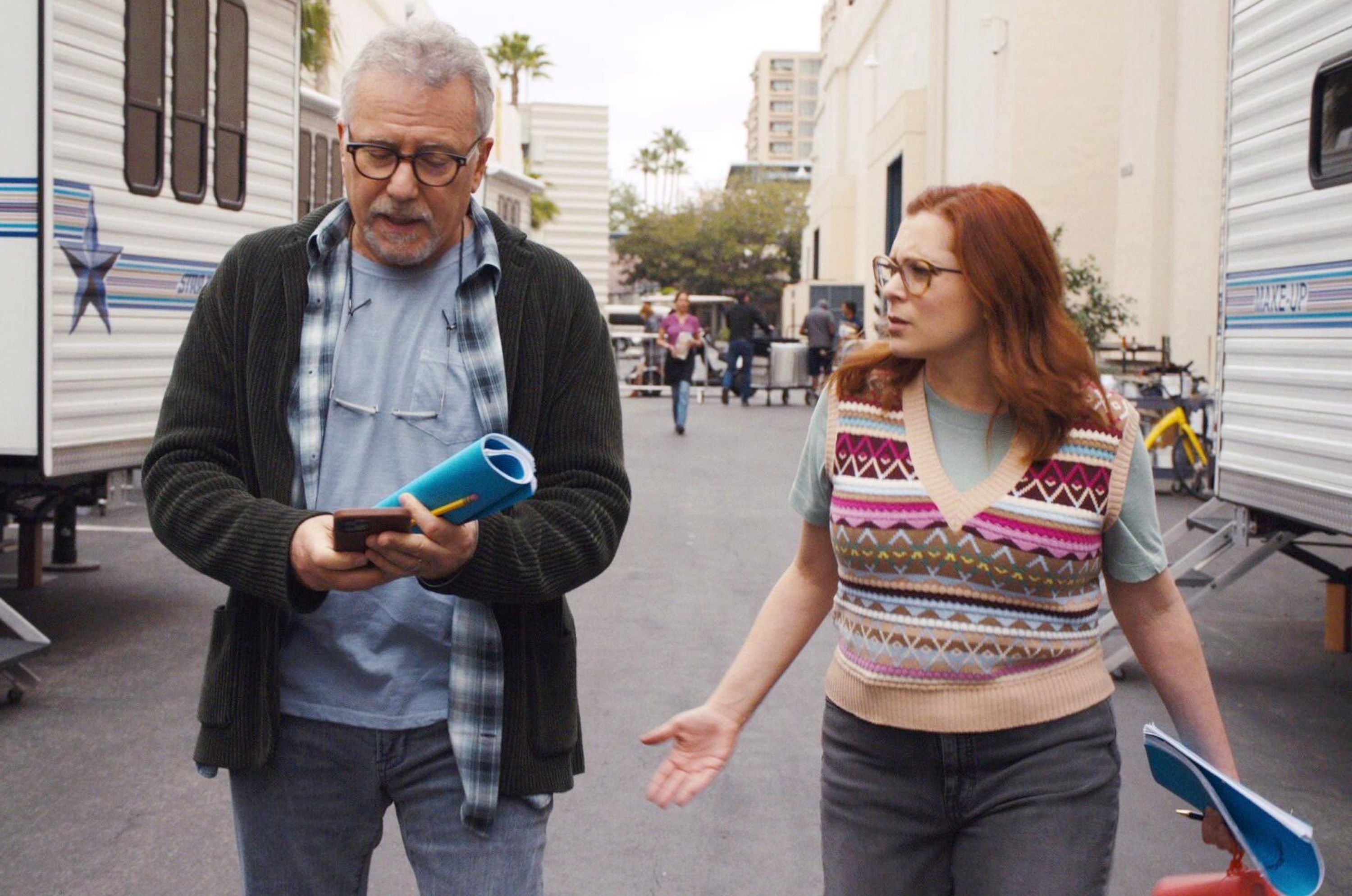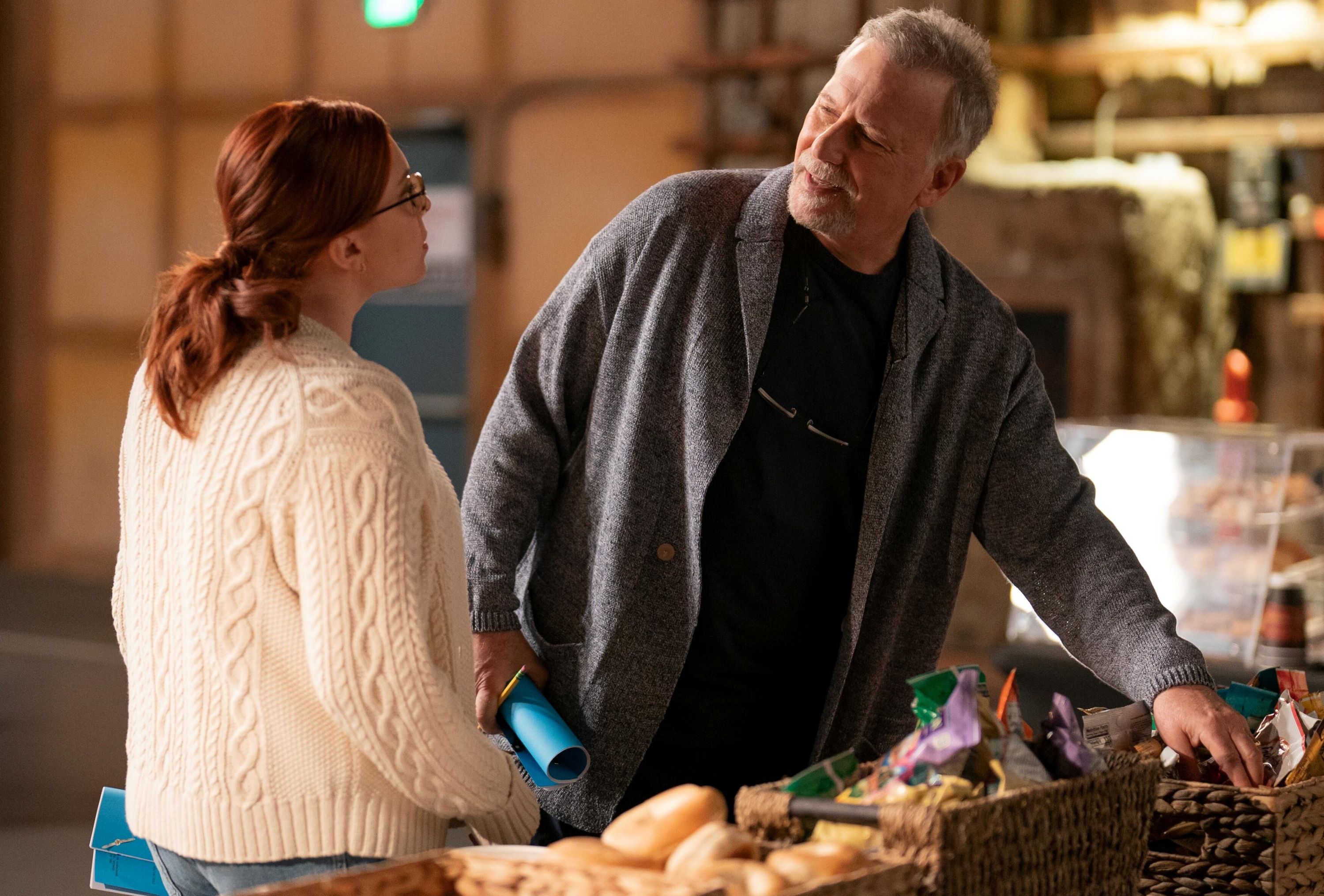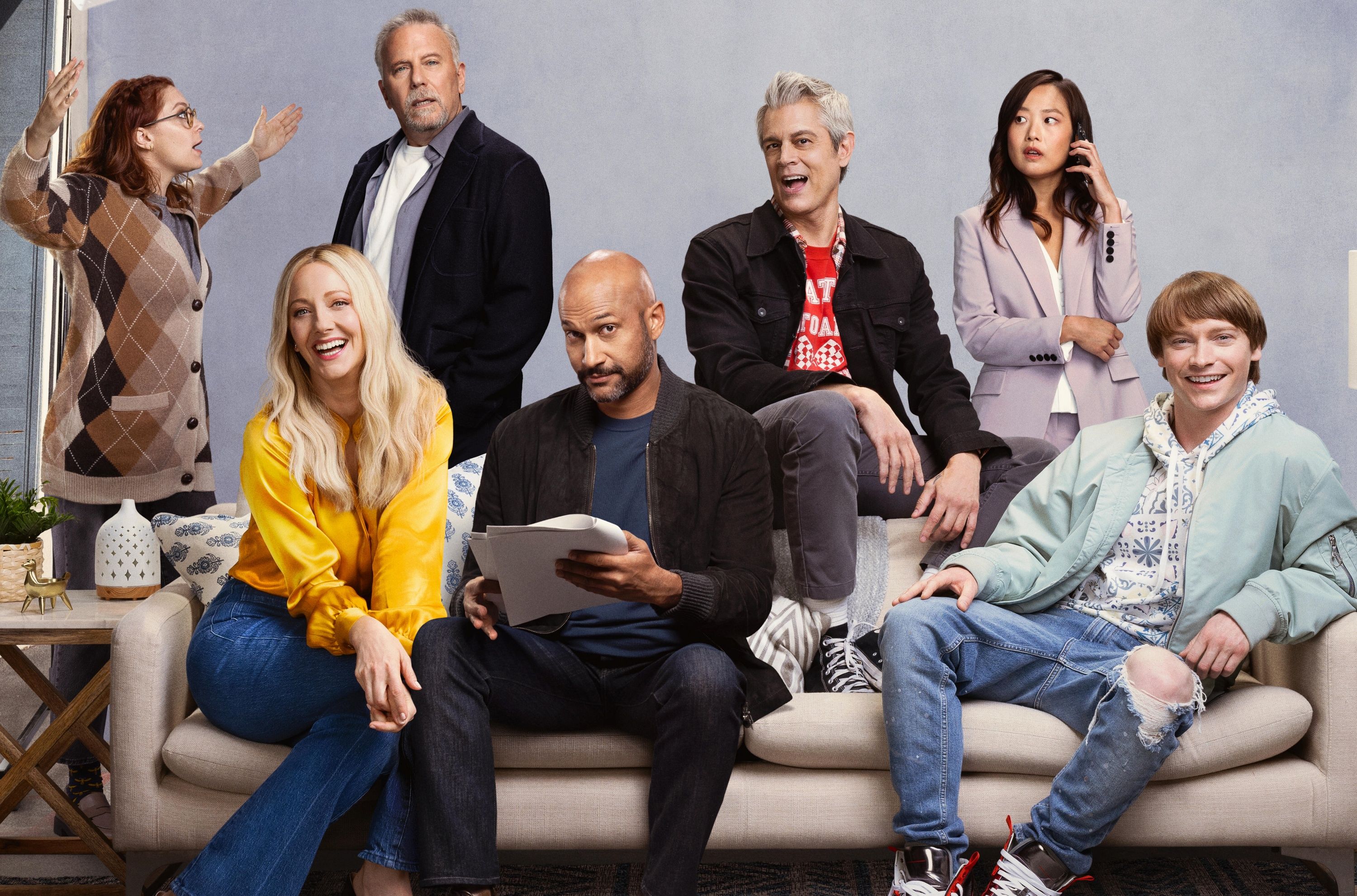From creator Steve Levitan (Modern Family), the Hulu original comedy series Reboot follows the stars of an early 2000s family sitcom, called Step Right Up, as they reunite for a reimagined reboot. Actors Reed (Keegan-Michael Key), Bree (Judy Greer), Clay (Johnny Knoxville), and Zack (Calum Worthy) must face their own dysfunction and unresolved issues, if they’re ever going to get their lives and careers back on track.
During this interview with Collider, co-stars Rachel Bloom (who plays Hannah, the showrunner of the reboot with some personal motivations) and Paul Reiser (who plays Gordon, the creator of the original series) talked about how important the quality of a script is, the embarrassment of riches of this project, why comedy can be mathematical, how this series allows them to have their cake and eat it when it comes to comedy, and what they most enjoyed about exploring the relationship between their characters.
PAUL REISER: Christina, this is gonna be perhaps the 10 most exciting minutes of your life, up to this point.
Collider: I have no doubt, whatsoever.
REISER: Trust me.
I am a tough sell on comedy and I laughed out loud during every episode, so thank you for being so funny.
REISER: No, thank you. Why are you a tough sell? In what way?
I think it’s because comedy can feel so forced and unnatural. It’s rare when something is genuinely just really funny and can make me laugh out loud.
REISER: Good.
RACHEL BLOOM: Thank you.
Rachel, being not just a creator, but a comedy creator, yourself, does it set the bar higher, when you’re looking at possible comedy projects that you want to get involved with?
BLOOM: Yeah. For every project that I get involved with, as an actor, the quality of the script is always the most important thing, and I’m a tougher sell because I’m a writer. And this is very well written.
Paul, as someone who’s done a lot of comedy and you’ve been involved with some very successful comedy projects, do you also have a high bar for comedy projects that you want to do?
REISER: No, I’ll do anything. Yeah. Something has to appeal to you. Sometimes the script is great, and/or the people involved are great. In this case, it was an embarrassment of riches. Everybody involved, the cast is so good. Across the range, everybody has such different strengths. Rachel’s skill set is different Keegan-Michael Key, who is ridiculously skilled, and Judy Greer is really funny. They compliment each other, but they’re all different. Calum [Worthy] and Krista [Marie Yu] were great. Johnny Knoxville was such a surprise because he’s so touching and so funny in this. As we get older, it’s not just the quality of script. Of course, you wanna do something that’s good, but it’s also the fact that we have this much time left, so how do you wanna spend it? I look at it and go, “That’s gonna take three months. That’s not gonna be pleasant.” I’ve done shows for 25 episodes. This was eight episodes, with these talented people, on a studio a lot. I was like, “This is gonna be fun.” And it was great. Speaking for myself, I’m less inclined to do something that starts with me in a mud heap, in the middle of the night. I once got a script that said, “Fade in: India, Ganges River, mud. A face emerges.” I was like “Yeah, not doing it. You lost me at ‘Fade in.’”
When you read something that presents itself as a comedy, do you have to laugh while you’re reading the script, the first time? Is that a requirement for you to sign on, or do you just have to see the potential there?
BLOOM: As an actor, if you’re saying, “I see potential, we can get there,” if the script needs work and you have a high bar for the quality of a script, hopefully you don’t have to say that. There’s a line that Keegan has about my character’s script. He says, “It’s both the funniest thing you’ve ever read, and you won’t laugh once.” I think there’s this debate in comedy right now, over comedies and comedy. There’s room for both. The word comedy means so many different things now. And this is actually a comedy that’s really funny.
REISER: I don’t know if this is true of actors, where comedians love to laugh, but often we’ll just [be serious and] go, “It’s funny.” We totally mean it. We’re not holding back.
BLOOM: There’s a comedy math going on, especially when you’ve done it so much. That also happens with me. I learned sketch comedy in a very almost mathematical way. Sometimes when I watch comedy, especially sketch, it has to really surprise me. Otherwise, I’m going, “Okay, I see that this is, and I see what this is.” That’s what Paul is saying.
REISER: With this show, the script was funny and we laughed, but we also did see room where it would be fun, and some of it was developed. As we did the first episode, (show creator) Steve Levitan would go, “Okay, I think we can have fun with that.” There’s a scene in the writers’ room of the show where the writers go, “Can you say that anymore? What can’t you say anymore?” Some of that came out of having a Zoom HR meeting, where somebody had to do the pro forma stuff of, “If anybody feels threatened . . .” You’re all thinking, “I wanna say the most inappropriate thing now, just because it will be really funny,” but you can’t. In our show, you can have the characters say, “Would I be able to compliment her on her child-bearing hips?,” and you can say back, “No, you can’t.” You get to have your cake and eat it too. You get to say the inappropriate thing, and have somebody else slap you down and go, “Asshole, it’s 2022. You don’t say that.”
There’s a back and forth between your characters, with him wanting to add things in that she doesn’t think are funny, so she takes them back out. You don’t have to name the project, but have either of you ever had an acting job where they wanted you to do something just completely crazy and outlandish, and tried to pass it off as comedy, or are you good at drawing a line with things like that?
REISER: It takes a bit of experience to be able to say, “No,” and you can say no. I can certainly look back on things that I’ve done and say, “I wish I had had the confidence to go nix that.” On the other hand, sometimes I go, “All right, you know what? I was uncomfortable, they pushed me, and it was funny.” It’s a gamble. Sometimes you’re feeling more courageous, and sometimes you’re feeling more protective and chicken.
BLOOM: I haven’t done enough where I haven’t been in control yet to really do that. I think that there are times I should have said, “I feel like this isn’t good,” and I didn’t.
The relationship between your characters is a lot. Even though it seems like Hannah started down this path of rebooting the show because she was being a bit vindictive toward Gordon, it actually really turns into a bonding and learning experience for them. What did you most enjoy about what’s essentially their love story and the place that they get to, by the end of this season?
BLOOM: It’s one of the most fundamental relationships we have, the relationship between a parent and a child. It’s maybe one of the most fundamental formative relationship of our lives. In this generational clash, it’s not only a work clash, it’s also literally clashing with your previous genetic material. There’s nothing more primal than that.
REISER: From my own experience, on Mad About You, one of the great pluses about it was that myself and all the writers would bring in storylines that were funny, but you also get to work out personal stuff. I would get to rewrite conversations that I actually had with my wife, where I wish I would have said something kinder or funnier, or whatever. I’m well aware of art being a remedy or a rewrite or a reboot, if you will, of life, where you can go, “Here’s how that conversation could have gone.” And with this show, Reboot, Rachel’s character and my character use the show, sometimes in different ways, to say what we wanna say to each other, but we can only do it through the characters on Step Right Up. Sometimes that’s the best you can do. It’s valid. It may not be as clear and direct as going, “Here’s what I wanna say to you,” but it’s a true thing. Writers use their work to work out their stuff. This relationship is so fraught with history and differences, but it’s really a joy to play. I hope we get to do more because I think there’s so much to unpack. You’re right, Hannah did come into this vindictively, wanting to straighten it all out and have fun with it, and Gordon came in with his fists up and, and they both changed. I think there’s so much more to dig into.
BLOOM: It’s also my theory that Hannah wrote this script, originally, as an exercise in therapy, to engage with her past like, “Well, what happens, if you rewrote something happy from your past?” And then, she rewrote it in therapy and was actually like, “Wait, should I try to sell this? Is this actually really good?” A storyline that I’d like to pitch for Season 2 is her therapist wanting credit.
Reboot is available to stream at Hulu.




